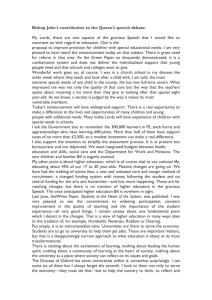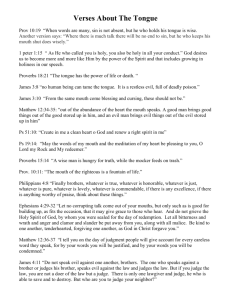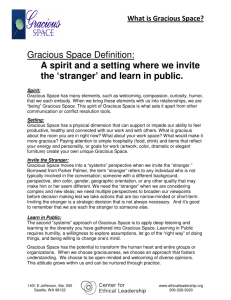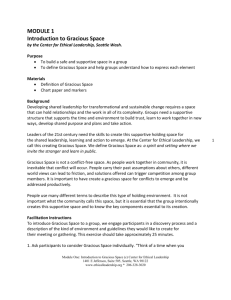Why we believe it: We believe this not because we have tried and
advertisement
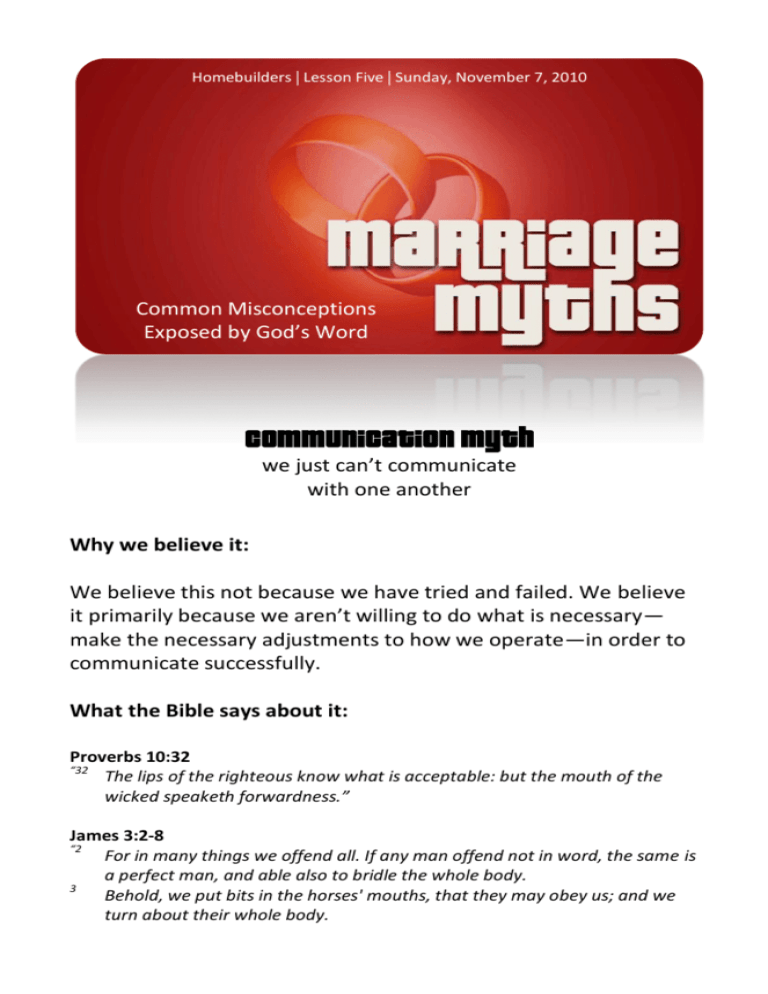
Homebuilders | Lesson Five | Sunday, November 7, 2010 Common Misconceptions Exposed by God’s Word we just can’t communicate with one another Why we believe it: We believe this not because we have tried and failed. We believe it primarily because we aren’t willing to do what is necessary— make the necessary adjustments to how we operate—in order to communicate successfully. What the Bible says about it: Proverbs 10:32 “32 The lips of the righteous know what is acceptable: but the mouth of the wicked speaketh forwardness.” James 3:2-8 “2 For in many things we offend all. If any man offend not in word, the same is a perfect man, and able also to bridle the whole body. 3 Behold, we put bits in the horses' mouths, that they may obey us; and we turn about their whole body. 4 5 6 7 8 Behold also the ships, which though they be so great, and are driven of fierce winds, yet are they turned about with a very small helm, whithersoever the governor listeth. Even so the tongue is a little member, and boasteth great things. Behold, how great a matter a little fire kindleth! And the tongue is a fire, a world of iniquity: so is the tongue among our members, that it defileth the whole body, and setteth on fire the course of nature; and it is set on fire of hell. For every kind of beasts, and of birds, and of serpents, and of things in the sea, is tamed, and hath been tamed of mankind: But the tongue can no man tame; it is an unruly evil, full of deadly poison.” Introduction: ___________________________________________ ______________________________________________________ ______________________________________________________ “Couples must have a mutually agreed upon system of talking with and listening to each other. Since all communication is learned, what is not helpful can be unlearned and new skills substituted for those that hinder the relationship.”—Dr. David Mace 1. You Can Communicate with ____________ A. Deep communication is __________ and transparent. 1 John 4:18 “18 There is no fear in love; but perfect love casteth out fear: because fear hath torment. He that feareth is not made perfect in love.” Five levels of conversation: Cliché Fact Opinion Emotional sharing Transparency (sharing thoughts, feelings, and needs) —From Why Am I Afraid to Tell You Who I Am? by John Powell “You must be careful to avoid hurting your mate. But many marriages are in such need of sharing feelings that the risk must be taken. If you can’t share feelings with your spouse, your marriage is on superficial ground. You won’t grow, and neither will your partner.”—Dennis Rainey B. Deep conversation is meaningful in ___________. Meaningful topics for conversation: What you read today in the Bible. Your concerns in life. What you’d like to pray about. Things you’re thankful for. Hopes for your children. Areas where you’re attempting to grow. To communicate with depth: Determine what you want to say. Determine how you want to say it. Determine when you want to say it. —From Starting Your Marriage Right by Dennis and Barbara Rainey C. Deep conversation includes __________________. James 1:19 “19 Wherefore, my beloved brethren, let every man be swift to hear, slow to speak, slow to wrath:” Levels of listening: Fake listening Selective listening Defensive listening Surface listening Focused listening 2. You Can Communicate with ____________ Luke 4:22 “22 And all bare him witness, and wondered at the gracious words which proceeded out of his mouth. And they said, Is not this Joseph's son?” Colossians 4:6 “6 Let your speech be alway with grace, seasoned with salt, that ye may know how ye ought to answer every man.” A. Gracious communication is __________________. Colossians 3:15 “15 And let the peace of God rule in your hearts, to the which also ye are called in one body; and be ye thankful.” “It’s not enough to merely see the good; a mate needs to hear your appreciation of it. I learned that four compliments are required to offset one criticism and maintain a balance of self-worth in a person.”—Jim Binney B. Gracious communication is ______________. Ephesians 4:15 “15 But speaking the truth in love, may grow up into him in all things, which is the head, even Christ:” C. Gracious communication is __________________. Ephesians 4:29a “29 Let no corrupt communication proceed out of your mouth…” Proverbs 18:21 “21 Death and life are in the power of the tongue: and they that love it shall eat the fruit thereof.” D. Gracious communication is __________________. Ephesians 4:29 “29 …but that which is good to the use of edifying, that it may minister grace unto the hearers.” Proverbs 16:24 “24 Pleasant words are as an honeycomb, sweet to the soul, and health to the bones.” Proverbs 12:25 “25 Heaviness in the heart of man maketh it stoop: but a good word maketh it glad.” E. Gracious communication is __________________. Matthew 5:7 “7 Blessed are the merciful: for they shall obtain mercy.” “What is mercy? It is my commitment to appeal to another’s perceptions for the purpose of ministering to him at the level of his need. It is crawling inside someone else’s skin, feeling what he feels, and on the basis of the understanding gleaned, ministering to him.”—Jim Binney 3. You Can Communicate with Effectiveness A. Effective communication seeks to _____________ before being understood. 1 Peter 3:7 “7 Likewise, ye husbands, dwell with them according to knowledge, giving honour unto the wife, as unto the weaker vessel, and as being heirs together of the grace of life; that your prayers be not hindered.” “The tendency is to devote our efforts to getting our mate to come to where we live rather than going to where he or she is. In fact, many marriages deteriorate into a scratching, clawing effort to get the other mate to ‘understand me’. We are naturally more conscious of our own needs and sensitive to them than we are to those of our mate.”—Jim Binney B. Effective communication considers the _________ beyond the words. Matthew 15:18 “18 But those things which proceed out of the mouth come forth from the heart; and they defile the man.” C. Effective communication makes _______________ use of tone of voice, facial expression, and body language. D. Effective communication bears the ____________ ahead of the words. John 14:1 “1 Let not your heart be troubled: ye believe in God, believe also in me.” E. Effective communication _______________ before speaking. Proverbs 15:28 “28 The heart of the righteous studieth to answer: but the mouth of the wicked poureth out evil things.” Conclusion: ____________________________________________ ______________________________________________________ ______________________________________________________




